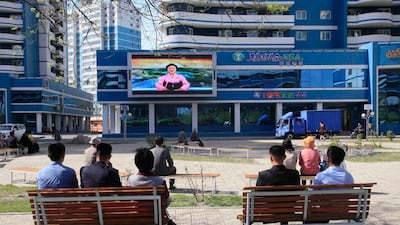North Korea's surprise suspension of missile testing and the promised closure of its testing site at Punggye-ri was branded "big progress" by Donald Trump. For the mercurial US president, troubled by domestic scandal, it is an opportunity to claim progress that was unthinkable just months ago. But ahead of North Korean leader Kim Jong-un's decisive talks with his South Korean and US counterparts, a moment of reflection is required. Almost 30 years of post-Cold War consensus on the perils of nuclear proliferation have led us here. And while the recent thaw has come at lightning speed, cautious optimism is required when it comes to all things North Korean.
Just a few months ago – as Mr Kim and Mr Trump traded barbs amid a string of missile tests – the two seemed to be staggering towards a direct military confrontation. But Mr Kim will meet South Korean President Moon Jae-in on Friday and Mr Trump next month. It follows the Pyeongchang Winter Olympics in February, where the two Koreas successfully fielded unified teams, and incoming US Secretary of State Mike Pompeo embarked on a secret visit to North Korea over Easter. Add the suspension of missile testing and the mood music ahead of the summits sounds very positive. Mr Trump deserves credit for breaking new ground where previous administrations have failed. But deeper scrutiny shows the need for realism. Mr Kim's claim that Pyongyang "has accomplished credible weaponisation of nuclear forces" could well be behind the decision to suspend missile testing. Indeed, North Korea's nuclear programme has been quiet since last November, when Pyongyang tested a missile reportedly capable of reaching the US mainland. There is no indication that North Korea will surrender its weapons. For Mr Kim, the nuclear programme has served its purpose; he can now focus on North Korea's feeble economy. Meanwhile, a summit with a sitting US president is in itself a prize that eluded Mr Kim's predecessors. In 2009, after Bill Clinton visited Mr Kim's father, it emerged the despot was desperate for a meeting with then president Barack Obama. It is a prize that Mr Trump may have yielded too easily.
Mr Kim appears to see nuclear proliferation as the best means by which to preserve his regime and give it global relevance. Often underestimated as a hysterical maniac, the North Korean strongman has broken new ground, purportedly completing his menacing nuclear programme and affording himself global prestige by manoeuvring himself into discussions with a sitting US president. Trust is everything in international diplomacy but North Korea has a legacy of broken promises. In 2003, the country withdrew from the Nuclear Non-Proliferation treaty, 18 years after signing it. And one year after agreeing to abandon its nuclear programme in 2005, Pyeongyang tested its first nuclear weapon. The recent breakthrough offers some optimism but the world should not lose sight of the threat Mr Kim still poses.
Follow The National's opinion section on Twitter

